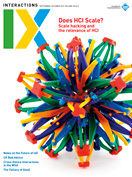Authors:
Elizabeth Churchill
Time is an illusion. Lunchtime doubly so.—Douglas Adams [1] One of the most talked about cadences in HCI is the design lifecycle that involves the following phases: understanding a problem or area, defining what issues there are for people, doing some ideation, then prototyping and testing (e.g., Figure 1). It is baked into our processes and practices in HCI. Figure 1. The Stanford d.school design-process model. There are variations of this cadence, but in all cases there are groupings of activities that are sequenced into phases. And each phase implies a certain amount of dedicated time and progress toward…
You must be a member of SIGCHI, a subscriber to ACM's Digital Library, or an interactions subscriber to read the full text of this article.
GET ACCESS
Join ACM SIGCHIIn addition to all of the professional benefits of being a SIGCHI member, members get full access to interactions online content and receive the print version of the magazine bimonthly.
Subscribe to the ACM Digital Library
Get access to all interactions content online and the entire archive of ACM publications dating back to 1954. (Please check with your institution to see if it already has a subscription.)
Subscribe to interactions
Get full access to interactions online content and receive the print version of the magazine bimonthly.






